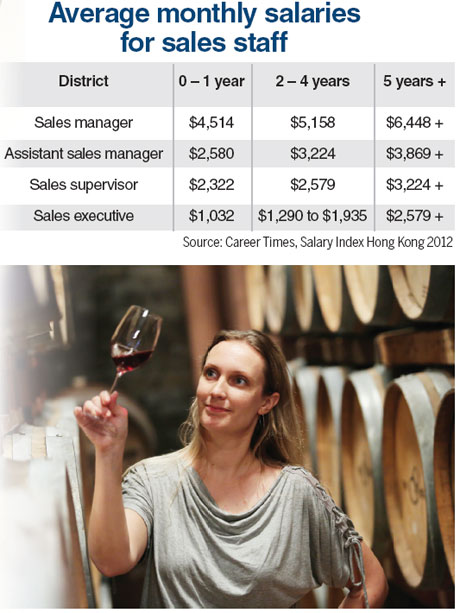8th Estate Winery Hong Kong
Updated: 2013-08-23 07:16
(HK Edition)
|
|||||||||
It all started at a dinner party at Lysanne Tusar's parents' home in Vancouver, Canada, just after the New Year in 2007, when those present, including some of her closest friends, drifted into a conversation about how grapes were being frozen at vineyards, then shipped by refrigerated containers to another destination to be made into wine.
"It hit me like a lightning bolt (then)," says Tusar, who admits that the group of friends, fueled by lots of wine talked about the trend with so much gusto, about the value of bringing "people to the wine rather than wine to the people", that it caught her imagination.
The rest is history. Tusar did some research and decided to open a winery in Hong Kong, the 8th Estate Winery, to offer the city's people the opportunity to make wine on their own turf, as well as own and taste wine at its very best.
With the assistance of InvestHK, Tusar took up the posts of director and chief marketing officer at 8th Estate Winery, and started the business. The company established its operations at Ap Lei Chau in a 4,000-squarefoot space, featuring a furnished outdoor terrace overlooking the ocean. The venue is used for corporate events, cocktail receptions, banquets and wine-tasting events.
Asked why the company's name had the figure 8, Tusar explains she chose it because it's a lucky number in China and the circular eight translates visually well with wine, as grapes, barrels and bottles are all circular.
"At the time I was doing my research, wine duty was reduced from 80 percent to 40 percent, reflecting the fact government was taking this industry seriously and to make the lives of those involved in the business easier," Tusar says.
Like many start-ups, times were tough when the company began, Tusar says, and it faced financial difficulties, but fortuitously wine taxes dropped to zero, making her life much easier.
"Since we started, we have produced five vintages, and we are growing steadily," Tusar says, admitting it was a struggle, but that she enjoys it.
The 8th Estate Winery has three full-time staff, including Tusar and two part-timers. And during the production period, two to three more people are hired to cope with the workload.
Tusar says the company is now doing only one production per year, with grapes from either the northern or southern hemisphere, and it could double production in the near future when opportunity presents.
The 8th Estate Winery processed 40 tons of grapes in the first year, and subsequently it has been processing 30 tons of grapes per year.
Although the company has produced vintages from France, Italy, and different regions in Australia, Tusar says it is always a difficult decision to decide which region to source for quality grapes annually. This is because the best quality grapes will change every year as the grapes depend upon the quality of their growing season.
Grapes sourced by the 8th Estate Winery from grape-producing countries are frozen within five hours after being harvested by hand, and then exported to Hong Kong via refrigerated containers.
As the production process takes place in Hong Kong, technically, the wine produced from the frozen grapes - despite their country of origin - is deemed to be "made in Hong Kong" wine.
"All 8th Estate Winery's wine is produced to the highest quality," Tusar explains, adding that, "Under the mainland and Hong Kong Closer Economic Partnership Arrangement (CEPA), the 8th Estate Winery's wine can be exported to the mainland and enjoy a preferential tax of 8 percent. The same wine produced in the country of origin, if exported to the mainland, will be subject to 41 percent tax," she says.
Tusar is looking for investors and partners who would like to work with her to export the "made in Hong Kong" wine using frozen grapes to the fast developing market on the mainland.
"The 'made in Hong Kong' wine is no different from the wine produced in the country of origin," Tusar says, noting that the company's wine was given a silver award at the Shanghai International Wine Challenge event in 2011 and 2012.
The winery produces 100,000 bottles of red, white and dessert wines per annum, 60 percent of which are sold and the remainder kept for aging. The winery has some big on-trade customers but it also sells to the public via its website and at its regular winery wine tastings.
Customers have been buying the wine not just for consuming but also as private investments since their unique nature adds to their rarity value. The wines cost from HK$120 to HK$380 per bottle.
8th Estate Winery also offers the unique service of personalizing a barrel of wine, containing 220 liters of wine, to customers own tastes. Alongside its wine sales, the winery also hosts private functions where wine lovers can sample the atmosphere of a working winery while enjoying the discounted wines on the premises.
8th Estate Winery carried out another round of production in the first week of August.
Presently, all wine produced by 8th Estate Winery is only sold in Hong Kong.

(HK Edition 08/23/2013 page6)